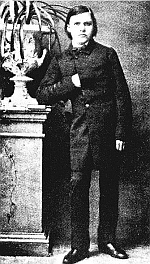FICTION
|
SUSPENSE
|
|

|
|
|

Friedrich Wilhelm Nietzsche
19th-century German philosopher and classical philologist known for His
style and radical questioning of the value and objectivity of
truth. Nietzsche's influence remains substantial within and
beyond philosophy, notably in existentialism and postmodernism.
His key ideas include the death of God, perspectivism, the
Übermensch, the eternal recurrence, and the will to power.
|
|
|
|
BOOK
ILLUMINATIONS
From Merrimon Book Reviews
|
|
The Executor

by Jesse Kellerman

Dynamic philosophical and psychological
thriller
Harvard philosophy
graduate student Joseph Geist is so close to finishing his
dissertation, but when his girlfriend throws him out, the absence of
her financial support threatens his future. The change in
dissertation director presents one more hurdle to slow his
progress. Without the department's support, his prospects
diminish. Looking for a job outside of academia becomes a
necessity. When Joseph spots an advertisement in the school
newspaper for a conversationalist, he cannot resist. The job
seems an answer to his dilemma. Indeed, Joseph forms an
increasingly close relationship with Alma. She understands and
appreciates him in ways others don't. She values those things he
does. Above all, she believes in him and wants to assist his
pursuit of philosophy. Can this happy environment last?
Will the detached man of ideas, a believer in free will, now finally be
able to follow his dreams now that he is not chained down by the
mundane world or will the newly found freedom unmask something much
more nefarious?
Jesse Kellerman's THE EXECUTOR is dynamic thriller that pays homage to
literary classics while also situating classic philosophical questions
in a new setting --- not just the setting of the character but also the
thriller genre itself. Joseph Geist is a man who at first elicits
a certain amount of sympathy, especially for readers familiar with the
disjuncture between the ideals and practical realities of
academia. One almost believes in his ascetic noble ideals and yet
Jesse Kellerman builds the character with a few unlikeable
characteristics from the very beginning to keep a reader on edge
questioning the character and reliability of the narrator. As
events unfold, one wants him to succeed in part, and yet, in seeing the
connection with the other characters, one feels the building momentum
of disaster as one event leads to another and Joseph's thoughts change
towards the characters he sees. The genius of THE EXECUTOR shines
not so much in exciting twists at the end, which a reader of classic
literature will expect beforehand, but more in how the author builds
the events that lead to that ending. Jesse Kellerman creates an
eerie effect as the reader watches the events through Joseph's eyes and
inner thoughts. The philosophical question of free will becomes
more than idle detached speculation as the characters move from
detached individuals to characters in close proximity with conflicting
goals that put pressure on one another. One hopes against all
hope for free will and the action of one individual to stop the
impending doom, but with each step, the characters seem to head
straight to the awaiting crisis. Perhaps even more eerie is how
the reader him or herself feels compelled by the unfolding drama even
while suspecting at least part of the upcoming events. THE
EXECUTOR is a gripping thriller that expertly manipulates the reader's
expectations and sympathies in the process of casting doubt on
both. Beyond the story itself, THE EXECUTOR poses intriguing
questions about free will within the context of the reader and the
writer's ability to influence the reader within the fictional world he
creates.
Reviewed by Merrimon,
Merrimon Book Reviews
Courtesy of Amazon Vine

|
|
|